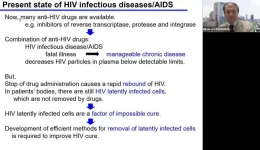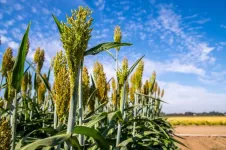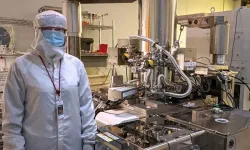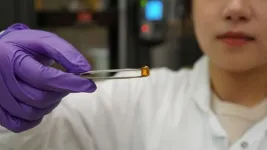(Press-News.org) SAN FRANCISCO — PLOS today is announcing that it will soon launch two new journals: PLOS Mental Health and PLOS Complex Systems. PLOS sees these new journals as an opportunity to give evolving research communities opportunities to forge a new path for research in the field. Whether that means welcoming new ways of sharing research transparently or cementing new policies that enable research to be evaluated and rewarded more fairly, or simply finding a broader audience where research can make a greater real-world impact.
PLOS Mental Health provides a dedicated venue for all mental health research, connecting global experts from a broad range of disciplines and addressing challenges and gaps in the field of mental health research, treatment, and care in ways that put the lived experience of individuals first. This is an inclusive, peer-reviewed journal ensuring all ethical and rigorous research is shared openly to drive meaningful progress toward improved health and well-being around the world.
We are also pleased to announce that Charlene Sunkel and Rochelle Burgess as our Editors-in-Chief of PLOS Mental Health.
“I am excited to join PLOS which recognizes the value of people with lived experience of mental health conditions as key partners in producing research that are relevant and impactful,” said Charlene Sunkel, Editor-in-Chief, PLOS Mental Health. “This journal will bring research not only to the scientific community, but to the broader stakeholder community who are able to utilize evidence in efforts to promote and protect mental health and the well-being of all people.”
“This journal is launching at a time when we are witnessing a huge disruption in the status quo. Most importantly, a challenge to whose voices and whose knowledge counts in mental health, and the sciences more broadly,” said Rochelle Burgess, Editor-in-Chief, PLOS Mental Health. “With the launch of this journal, we have an opportunity to chart a new course for the ways in which mainstream and critical mental health perspectives are in dialogue with each other, which will have such positive implications for mental health policy and practice globally. It is an absolute dream to be a part of this from day one.”
PLOS Complex Systems will bring together impactful research that facilitates understanding of complex systems at the heart of the world we live in. This will be a truly transdisciplinary journal, welcoming research from any field that examines phenomena through a lens of complex relationships and models that track, measure, and predict outcomes. By bringing this research together and working with the research community to shape Open Science practices, we hope to empower researchers to share their work in ways that inspire ideas and accelerate progress while cross-fertilizing knowledge that enable solutions to fundamental challenges facing our society today.
Hocine Cherifi will serve as Editor-in-Chief of PLOS Complex Systems. Hocine will be joined by another Editor-in-Chief who will be named later this year.
“I am thrilled to be part of the launch of PLOS Complex Systems, a significant step forward in understanding the intricacies of our world. This journal has the power to break down disciplinary boundaries and encourage researchers to approach problems holistically, said Hocine Cherifi, Editor-in-Chief, PLOS Complex Systems. “I am excited to be on this journey as we uncover profound insights and drive innovation across multiple fields. Together, we have the opportunity to shape the future of complex systems research and make a lasting impact on scientific understanding and societal progress.”
Our new journals will encourage open-sharing behaviors that support rigor, reproducibility, and rapid dissemination of research. As with all PLOS journals, we’ll offer opportunities for authors to share preprints, improve access to data and transparency of methodologies, and choose to publish their peer reviews. Open Science Indicators will allow us to establish benchmarks for open-sharing behaviors in these fields for the first time, and to track changes over time to test whether our solutions are working.
“I’m really excited to deepen our work with the research communities and stakeholders who will be a part of these journals. We have worked intentionally with these communities of researchers who have shared a need for venues that do more than help researchers share their work,” said Rebecca Kirk, Publisher, Portfolio Development, PLOS. “Our journals will provide a space for experts of different disciplines to come together, to spark important discussions, and to explore and shape Open Science practices that will drive the field forward.”
A key element of expanding openness for PLOS is in bringing diverse voices together. Inclusivity and equity are core to a strong foundation of Open Science, and we need to hear from all perspectives to make science, the process of publishing science, and the solutions science inspires, more robust. PLOS Mental Health and PLOS Complex Systems will strive to represent research from local experts around the world, and from across various disciplines.
###
About the Public Library of Science
PLOS is a nonprofit, Open Access publisher empowering researchers to accelerate progress in science and medicine by leading a transformation in research communication. Since our founding in 2001, PLOS journals have helped break boundaries in research communication to provide more opportunities, choice, and context for researchers and readers. For more information, visit http://www.plos.org.
END
Welcoming two new journals to the PLOS portfolio: PLOS Mental Health and PLOS Complex Systems
2023-06-21
ELSE PRESS RELEASES FROM THIS DATE:
A new, promising weapon in the fight against HIV
2023-06-21
A research team led by Tokyo Medical and Dental University (TMDU) has identified a molecular compound that activates latent HIV-1 in cells, showing promise for HIV treatments
Tokyo, Japan – A multi-institutional research group led by researchers from Tokyo Medical and Dental University (TMDU) has made a significant and promising step forward in our ability to treat human immunodeficiency virus type 1 (HIV-1), the virus underlying acquired immunodeficiency syndrome (AIDS).
To appreciate their accomplishment, we must first know a little about why HIV-1 is difficult to eliminate. ...
A roadmap for gene regulation in plants
2023-06-21
– By Will Ferguson
For the first time, researchers at the Department of Energy’s Lawrence Berkeley National Laboratory (Berkeley Lab) have developed a genome-scale way to map the regulatory role of transcription factors, proteins that play a key role in gene expression and determining a plant’s physiological traits. Their work reveals unprecedented insights into gene regulatory networks and identifies a new library of DNA parts that can be used to optimize genetic engineering efforts in plants.
“Transcription factors regulate things like how plants grow, how much fruit they produce, ...
Cave excavation pushes back the clock on early human migration to Laos
2023-06-21
CHAMPAIGN, Ill. — Fifteen years of archaeological work in the Tam Pa Ling cave in northeastern Laos has yielded a reliable chronology of early human occupation of the site, scientists report in the journal Nature Communications. The team’s excavations through the layers of sediments and bones that gradually washed into the cave and were left untouched for tens of thousands of years reveals that humans lived in the area for at least 70,000 years – and likely even longer.
“When we first started excavating the cave, we never expected to find humans in that region,” said University of Illinois Urbana-Champaign anthropology professor Laura Shackelford, who led ...
New microcomb device advances photonic technology
2023-06-21
A new tool for generating microwave signals could help propel advances in wireless communication, imaging, atomic clocks, and more.
Frequency combs are photonic devices that produce many equally spaced laser lines, each locked to a specific frequency to produce a comb-like structure. They can be used to generate high-frequency, stable microwave signals and scientists have been attempting to miniaturize the approach so they can be used on microchips.
Scientists have been limited in their abilities to tune these microcombs at a rate to make them effective. But a team of researchers ...
Now, every biologist can use machine learning
2023-06-21
By Lindsay Brownell
(BOSTON) — The amount of data generated by scientists today is massive, thanks to the falling costs of sequencing technology and the increasing amount of available computing power. But parsing through all that data to uncover useful information is like searching for a molecular needle in a haystack. Machine learning (ML) and other artificial intelligence (AI) tools can dramatically speed up the process of data analysis, but most ML tools are difficult for non-ML experts to access and use. Recently, automated machine learning (AutoML) methods have been developed that can automate the design and deployment ...
University of Toronto Engineering researchers are using electric fields to control the movement of defects in crystals
2023-06-21
An international team of researchers, led by University of Toronto Engineering Professor Yu Zou, is using electric fields to control the motion of material defects. This work has important implications for improving the properties and manufacturing processes of typically brittle ionic and covalent crystals, including semiconductors — a crystalline material that is a central component of electronic chips used for computers and other modern devices.
In a new study published in Nature Materials, researchers from ...
Assessment of a peer support group intervention for undocumented Latinx immigrants with kidney failure
2023-06-21
About The Study: This study of 23 undocumented immigrants with kidney failure receiving emergency dialysis found that a peer support group intervention achieved feasibility and acceptability. The findings suggest that a peer support group may be a patient-centered strategy to build camaraderie and provide emotional support in kidney failure, especially for socially marginalized uninsured populations who report limited English proficiency.
Authors: Lilia Cervantes, M.D., of the University of Colorado, Anschutz Medical Campus, in Aurora, is the corresponding author.
To ...
Biodegradable gel shows promise for cartilage regeneration
2023-06-21
A gel that combines both stiffness and toughness is a step forward in the bid to create biodegradable implants for joint injuries, according to new UBC research.
Mimicking articular cartilage, found in our knee and hip joints, is challenging. This cartilage is key to smooth joint movement, and damage to it can cause pain, reduce function, and lead to arthritis. One potential solution is to implant artificial scaffolds made of proteins that help the cartilage regenerate itself as the scaffold biodegrades. How well the cartilage regenerates is linked to how well a scaffold can mimic the biological properties of cartilage, and to date, researchers have struggled ...
New study in Nature Water demonstrates a vastly more sustainable, cost-effective method to desalinate industrial wastewater
2023-06-21
Vanderbilt researchers are part of a team that has developed a cutting-edge method that seeks to make the removal of salt from hypersaline industrial wastewater far more energy-efficient and cost-effective.
While desalination through reverse osmosis has made tremendous strides—allowing for salt removal from seawater for less than a penny per gallon—it still falls short in eliminating saline in wastewater from industries like mining, oil and gas and power generation and in inland brackish water. The industrial brines are currently injected into deep geological formations or transferred to a evaporation ponds, and both disposal methods are facing more regulatory and ...
Researchers reveal mechanism of protection against breast and ovarian cancer
2023-06-21
In a new paper published today in Nature, researchers at the Francis Crick Institute have outlined the structure and function of a protein complex which is required to repair damaged DNA and protect against cancer.
Every time a cell replicates, mistakes can happen in the form of mutations, but specialised proteins exist to repair the damaged DNA.
People with mutations in a DNA repair protein called BRCA2 are predisposed to breast, ovarian and prostate cancers, which often develop at a young age. In the clinic, these cancers are treated with a drug that inhibits PARP, ...






